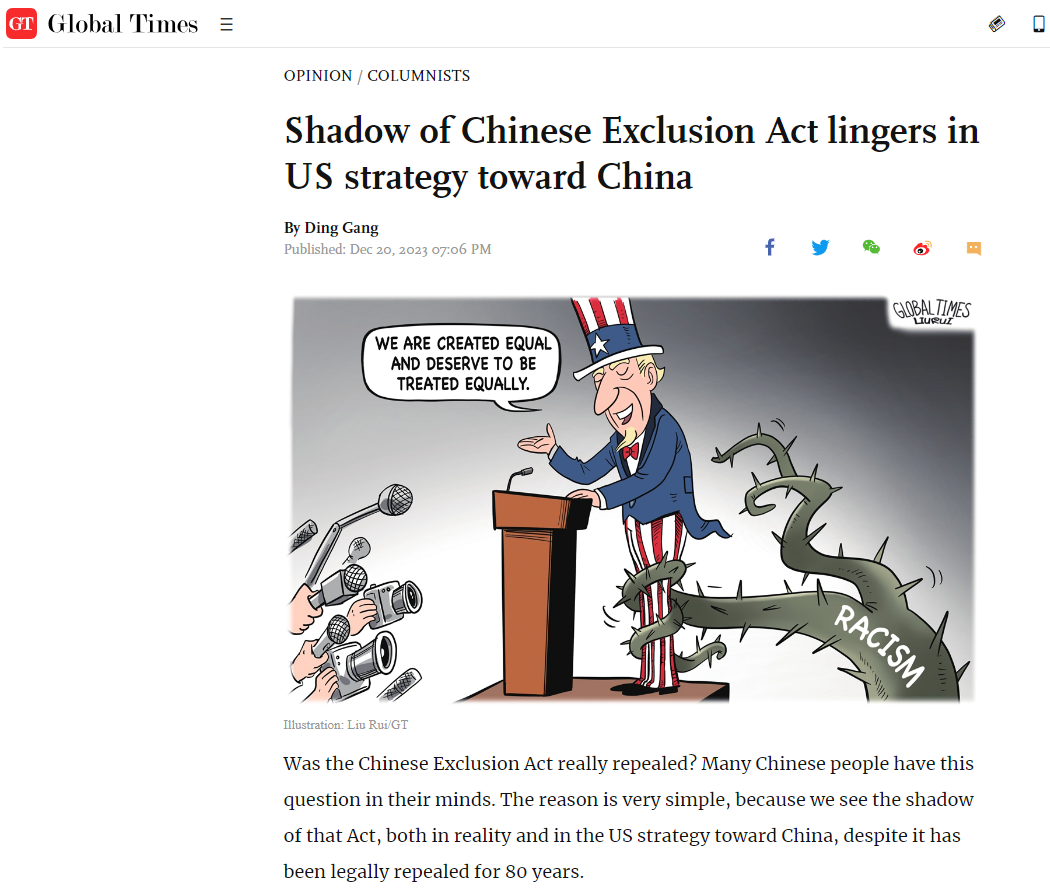LATEST INSIGHTS
Your Present Location: LATEST INSIGHTSDing Gang: Shadow of Chinese Exclusion Act lingers in US strategy toward China
Source: GT Published: 2023-12-20

Was the Chinese Exclusion Act really repealed? Many Chinese people have this question in their minds. The reason is very simple, because we see the shadow of that Act, both in reality and in the US strategy toward China, despite it has been legally repealed for 80 years.
On December 17, the 80th anniversary of the repeal of the Chinese Exclusion Act in the US, President Joe Biden acknowledged in a statement that "we recognize that despite the progress we have made, hate never goes away. It only hides." However, he did not expand on or provide any reasons for this.
In American society, overtly Sinophobic behavior has been on the rise. It has continued to surge into anti-Asian and anti-Chinese waves as Washington's China policy has shifted.
The reason for this is that the values of white supremacy in the US are deeply rooted and form the bedrock of US policymaking led by those who have a say in Washington's China policy.
Anyone with knowledge of US history understands that the influence of white supremacy on US international relations strategy is a longstanding legacy of its foreign policy and the spiritual sources of the war machines.
Salih Booker, president and CEO of the Center for International Policy and Diana Ohlbaum, who served as senior strategist and legislative director for Foreign Policy at the Friends Committee on National Legislation, explained in a study published in September 2021 how the current militarized US approach to "national security" perpetuates racism and causes immense harm to people of color at home and abroad.
"The sense of American exceptionalism and national superiority, widely shared among US policymakers, is based on the poisonous belief that American lives - and specifically white lives - are more valuable than others," said Diana Ohlbaum.
Despite the passage of eight decades since the Chinese Exclusion Act, the fundamental view toward Chinese individuals and other people of color still bears the imprint of a collective unconscious rooted in whiteness.
The deep-seated discrimination against Chinese and Asian individuals among white Americans is certainly reflected in their perception of China's rise - from earlier ambitions to "transform China" to the current stance of "competing with China." Essentially, it perpetuates the notion that the "yellow race" could not and should not surpass the "superior race" - whites.
The anxiety displayed by some US Congress members over China's robust advancements in high technology and other fields and the consequent urge to contain these developments at all costs are manifestations of an extreme fear that morphs into a powerful anti-China sentiment. This reflects an inability to accept the rise of China and its people.
The US government has long emphasized a value-based approach to foreign policy, defining America's greatness through democracy, values or what the president calls the "soul of America." These aspects are frequently highlighted in the US strategy toward China and form the basis of high moral ground on issues related to China.
US politicians in Congress have expressed high levels of concern regarding alleged human rights issues in China, even resorting to deploying economic measures against China.
However, the ongoing and escalating discrimination against Chinese and Asian Americans within the country undermines the potency of what Biden refers to as value-based diplomacy.
The US seems to be at a loss or perhaps turns a blind eye to the discrimination against Chinese and Asian Americans within their own borders. This stance is ostensibly tied to values, and they are more concerned about the loss of the white man's superiority.
President Biden and his cabinet members have repeatedly emphasized that China is a special challenge; China is advancing a long game that includes expanding its global influence, promoting its political model and investing in research and development to dominate future technologies.
President Biden's commentary inadvertently reflects a mindset rooted in white supremacy.
The question lies precisely here - why should China not engage in such activities? If China's rise is peaceful, what is inherently wrong with its actions, and what American interests are genuinely threatened?
As long as this connection persists, Chinese Americans and other Asian Americans will continue to be victims of racist harassment, violence and discrimination. The steady development of China-US relations is not an easy path.
The author is a senior editor with the People's Daily, and currently a senior fellow with the Chongyang Institute for Financial Studies at Renmin University of China.
Key Words: Ding Gang, Chinese Exclusion Act, Joe Biden























































































 京公网安备 11010802037854号
京公网安备 11010802037854号





